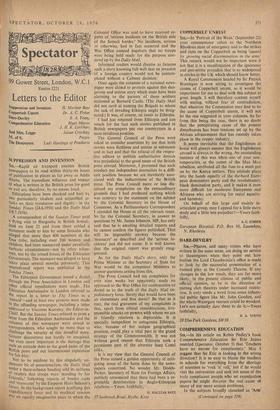Letters to the Editor
Suppression and Invention Copperbelt Unrest bare-Devilry Comprehensive Education
And Mrs. Legge M. of S.
The Destroyers H. Maclear Bate Dr. A. C. Fisher B. A. Young Hugh Morris J. H. K. Lockhart Julian Critchley Purple Lady Hardinge of Penshurst SUPPRESSION AND INVENTION
Sta,—Rapid air transport enables British newspapers to be read within thirty-six hours of publication in places as far away as Addis Ababa. The immediate influence and impact of what is written in the British press for good or evil are, therefore, by no means local.
Ethiopians have been shocked and hurt by two particularly virulent and unjustified at- tacks on their reputation and dignity : in the Sunday Times (24.6.1956) and the Daily Mail (18.7.1956).
A correspondent of the Sunday Times paid a flying visit to Hargesiha in BritiSh Somali-. land on June 21 and from there cabled a statement made to him by some Somalis who alleged that more than 400 members of the Essa tribe, including over 200 women and children, had been massacred under peculiarly barbaric circumstances—not by other tribes-
men by the armed forces of the Ethiopian Government. The massacre was alleged to have taken place several months previously. This Unconfirmed report was published in the Sunday Times.
The Ethiopian Government issued a denial through the Press Association in London and other official repudiations were made., The Ethiopian Ambassador in London referred to the report in a letter to The Times as a canard'--and at least two protests were made to the offending newspaper, including a letter addressed to Viscount Kemslcy, the Editor-in- Chief. But the Sunday Times refused to print a letter from the Ethiopian Ambassador and the columns of this newspaper were closed to correspondents, who sought no more than to challenge the veracity of this dreadful story. Greater discourtesy can hardly be imagined, but even more important is the damage that such an attitude does to the good name of the British press and our international reputation for fair play. Not to be outdone by this singularly un- Pleasant bit of sensationalism, the Daily Mail Under a three-column heading told its millions of readers that troops were 'standing by for Ethiopia,' following reports of border raids and 'massacres' by the Emperor Haile Selassie's 113rees. In the background report justifying this expeditionary force and its mythical mission was an equally imaginative piece in which the Colonial Office was said to have received re- ports of 'serious incidents on the British side of the Somali border.' No incidents, serious or otherwise, -had in fact occurred and the War Office assured inquirers that no troops were being held ready for the purpose con- jured up by the Daily Mail.
Informed readers would dismiss as fatuous• such a story knowing full well that an invasion of a foreign country would not be contem- plated withOut a Cabinet decision.
Once again the columns of a national news-, paper were closed to protests against this dan- gerous and untrue story which must have been alarming to the parents of those soldiers stationed at Barnard Castle. (The Daily Mail did not cavil at naming the Brigade to whom the task of invading Ethiopia might be desig- nated.) It was, of course, an insult to Ethiopia.
I had just returned from Ethiopia and can vouch for the fact such stories published in British newspapers put our countrymen in a most invidious position.
The General Council of the Press were asked to consider assertions by me that both stories were fictitious and untrue in substance and in fact and that the refusal of the respec- tive editors to publish authoritative denials was prejudicial to the good name of the British press abroad. Moreover, I protested that such conduct put independent journalists in a diffi- cult position because we are inevitably asso- ciated with the indiscretions of the British press. The Press Council more or less dis- missed my complaints on the extraordinary grounds that I had produced nothing which was contrary to the statement on the subject by the Colonial Secretary in the House of Commons. As a Parliamentary Correspondent
I attended the House at all the relevant times. So far the Colonial Secretary, in answer to questions by Mr. James Johnson, MP, has only said that he is awaiting detailed reports and he cannot confirm the figures published. That will be impossible anyway because the 'massacre' as described and the 'serious in- cidents' just did not occur. It is well known that the original report was grossly exag- gerated.
As for the Daily Mail's story, only the Prime Minister or the Secretary of State for War would be the competent Ministers to answer questions arising from this.
The Press Council had my complaints for over nine weeks but apparently made no approach to the War Office for confirmation or denial as to the truth of the Daily Mail ex- peditionary force. Surely that would have been an elementary and first move? Be that as it may, the real gravamen of my complaints is that, apart from ethical considerations, irre- sponsible attacks on powers with whom we are in friendly relations is deplorable. It is specially inexpedient to antagonise Ethiopia, who, because of her unique geographical position, could play a vital part in the grand strategy of the Commonwealth. It was not without good reason that Ethiopia took a prominent part of the abortive Suez Canal talks.
It is my view that the General Council of the Press missed a golden opportunity of miti- gating some of the harm done by the news- papers concerned. No wonder Mr. Dodds- Parker, Secretary of State for Foreign Affairs, publicly announced that there had been a re- grettable deterioration in Anglo-Ethiopian relations.—Yours faithfully,










































 Previous page
Previous page